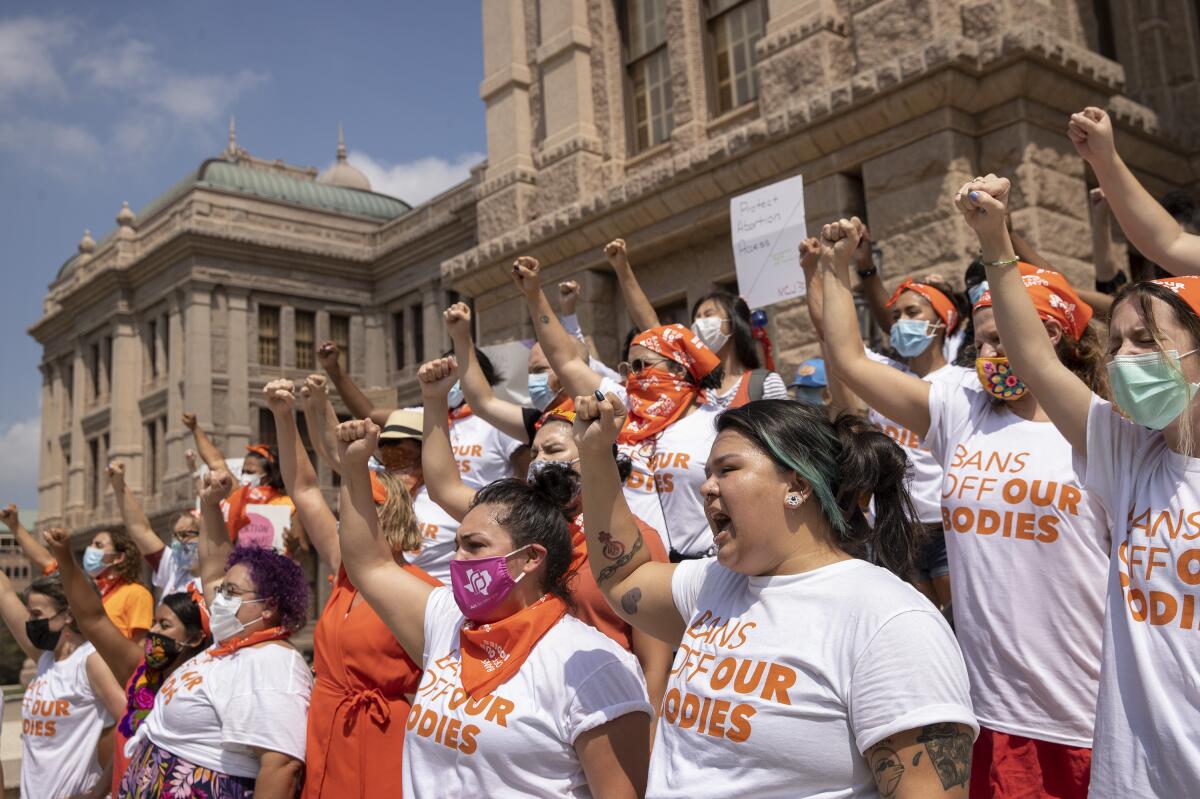Column: Love Texas’ SB 8 because you hate abortion? Wait until a copycat law comes for your gun rights

- Share via
For months now, the federal courts have aided and abetted an outrageous attack on the rule of law.
With judges’ willing participation, abortion opponents have succeeded in the most brazen deprivation of constitutional rights since Jim Crow. They’ve accomplished this reprehensible feat with an unprecedented and tortuous abortion-ban enforcement scheme that is itself a separate offense against the Constitution.
At the next opportunity, the Supreme Court should invalidate this scheme, which is tantamount to open season on constitutional protections in blue and red states alike.
The nastiness began with Texas’ notorious SB 8, which forbids most abortions after about six weeks of pregnancy, before many women even know they are pregnant, with no exceptions for rape or incest.
And of course other states have taken note. Last week, Idaho became the first state to pass a copycat SB 8 bill. “Texas’ clever, private course of action did good,” said one of the bill’s sponsors. “It stopped physical abortions, chemical abortions in their tracks.”
You have to wonder how Texas could get away with it. As it stands, the law of the land forbids a state from prohibiting abortions before the viability of the fetus, generally around 20 weeks, and from ignoring the health of the mother in its abortion laws.
In fact, the Texas statute is every bit as unconstitutional as it looks on its face. Indeed, no court or advocate in the months since it went into effect has as much as suggested that the law passes constitutional muster.
To bypass SB 8’s straightforward unconstitutionality, the Texas Legislature put its enforcement in the hands of private citizens, allowing them to sue anyone they believed to have obtained or aided a post-six-week abortion in the state. Challenging a statute’s constitutionality usually means asking a federal court to stop government officials from implementing and enforcing the law. With no such officials enforcing SB 8, federal review was blocked, and abortion, legal in every other state, was effectively banned.
As Chief Justice John G. Roberts Jr. has rightly observed, the scheme blatantly seeks to “nullify” federal law. But the real rub is the way the courts have aided in the nullification process.
It is routine — and an integral aspect of the federal courts’ duty — to enjoin a possibly unconstitutional statute while the courts evaluate challenges to the law. But with SB 8, the super-conservative Supreme Court majority (not including Roberts) and their like-minded colleagues on the 5th Circuit Court of Appeals readily jumped through hoops to evade that routine practice.
In cases brought separately by the Justice Department and Texas abortion providers, the justices and 5th Circuit judges relied on exotic, narrow arguments, mostly about the enforcement scheme, to bat away cases meant to restore women’s rights.
In December, the Supreme Court denied the Justice Department’s challenge and remanded the abortion providers’ case back to the 5th Circuit, which itself should have enjoined the law (or remanded to the district court to do so).
Instead, the 5th Circuit devised another time-consuming detour. It asked the Texas Supreme Court to determine if the state licensing officials named in the suit could in fact be targeted under SB 8’s strictures. On March 11, the Texas Supreme Court came back with a unanimous ruling: No.
As one of the challengers put it, “With this ruling, the sliver of this case that we were left with is gone.”
The courts’ refusal to stop SB 8 has to be understood against the other abortion case the Supreme Court is grappling with this term.
In May, the justices agreed to hear Dobbs vs. Jackson Women’s Health Organization, a test of another blatantly unconstitutional abortion ban (after 15 weeks), this time enacted in Mississippi in 2018. (The Mississippi law was immediately stayed, as it should have been.)
It is widely expected that the Jackson Health decision, due in June, will weaken if not eviscerate Roe and Casey. It doesn’t follow that the opinion will validate the more restrictive Texas law, but the Lone Star State will have gotten away with its extreme curtailing of the right to choose for close to a year, until the Supreme Court’s antiabortion cadre could finish the job.
Whatever one’s view of abortion — indeed whatever one’s view of the constitutionality of abortion regulation — this is a horrendous state of affairs. When states can impose labyrinthine enforcement regimes to selectively deprive their citizens of constitutional rights, the law is an ass.
Nothing about the Texas stratagem limits it to abortion rights. In California, Gov. Gavin Newsom is pursuing a firearm regulation using a similar enforcement scheme, with the liberal-state goal of exposing firearm companies to liability for conduct the Supreme Court has said the Constitution protects.
The Supreme Court can end this nonsense. It created the doctrine that permits possibly unconstitutional state laws to be enjoined by federal courts’ ordering officials not to enforce them pending review. If Texas has found a genuine hole in the fabric the high court created, the justices can apply a quick stitch to repair it.
Last week, a new challenge to SB 8 was filed. It might earn the law the stay it deserves. It might also present the Supreme Court with the opportunity to do what it should have done already: reaffirm the governing principle that a state can’t purposefully deny its citizens the protections of the Constitution.
The Supreme Court actively abetted SB 8’s dangerous “clever” scheme when it failed to stay the law. Now it needs to see to it that other states can’t follow Texas’ malicious example.
More to Read
A cure for the common opinion
Get thought-provoking perspectives with our weekly newsletter.
You may occasionally receive promotional content from the Los Angeles Times.











